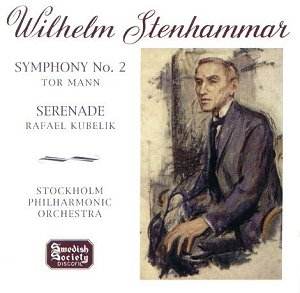Whether you have the Sixten Eckerberg recording
of the Second Symphony or that by Stig Westerberg – or indeed
the Naxos newcomer conducted by Petter Sundkvist – you will doubtless
have succumbed unreservedly to Stenhammar’s magnificent creation.
And if those shelves are laden or empty the reappearance of Tor
Mann’s performance brings to the catalogue a formidably attractive
reading. The 1959 recording leaves little to be desired, given
the general excellence of the original set up and the fine remastering;
there isn’t the full weight or body of sound of be found now and
the strings can be just a mite shrill above the stave but who’s
counting when confronted by a performance as all-encompassing
and heroic as this one.
In Mann’s hands those hieratic horns ring out
with tremendous force, the orchestral forces taut but generous,
the effulgent romanticism of the opening Allegro energico powerfully
sustained and the lower string delicacy tangible as touch. The
Andante gets a sense of motion and lift in this reading, the movement
packed with motifs and burgeoning action, almost prefiguring Martinů
in its thematic generosity. Stenhammar’s late-Romanticism here
rises to a crest of agitated drama whereas the third movement
Allegro has a bustly nobility, a corresponding rusticity and frolicsome
stamp that is winning beyond measure – doubly so in Mann’s
hands. How well he draws out the mordancy of the opening section
of the finale before unleashing the vital and imaginative fugato
episode – no pedant fugal episode this, it’s full of quirky emphases,
darting entry points, slippery and zestful, like trying to catch
a trout with one hand. Fantastic horn playing rings out once more,
strings are crisp, and the conclusion brings with it an admixture
of declamatory and almost grimly determined peroration. A wonderful
performance.
To add to the attractiveness of the disc there
is Kubelik’s near revelatory performance of the Serenade. The
work is marvellously life-affirming and in this 1965 recording
we have an equally committed performance, one stressing the lyrical
essence of the work, its vigorous ardour. The leader of the Stockholm
Philharmonic Orchestra shines brightly in the opening Overtura
amidst the verdant writing, the animation and affirmatory profile.
The Canzonetta positively glows with ripeness, the solo string
players excelling in their moments whilst the Scherzo is a vibrant
brass-led affair that, in Kubelik’s reading, misses no opportunity
to stress moments of reflective intimacy amidst the bustle. He
really does pace the Notturno exquisitely; the lower string voicings
balanced with masterly understanding and his finale is exultant
and decisive, full of panache and drive.
Here’s a disc to warm the heart and the spirit.
Consider it a rave review.
Jonathan Woolf
